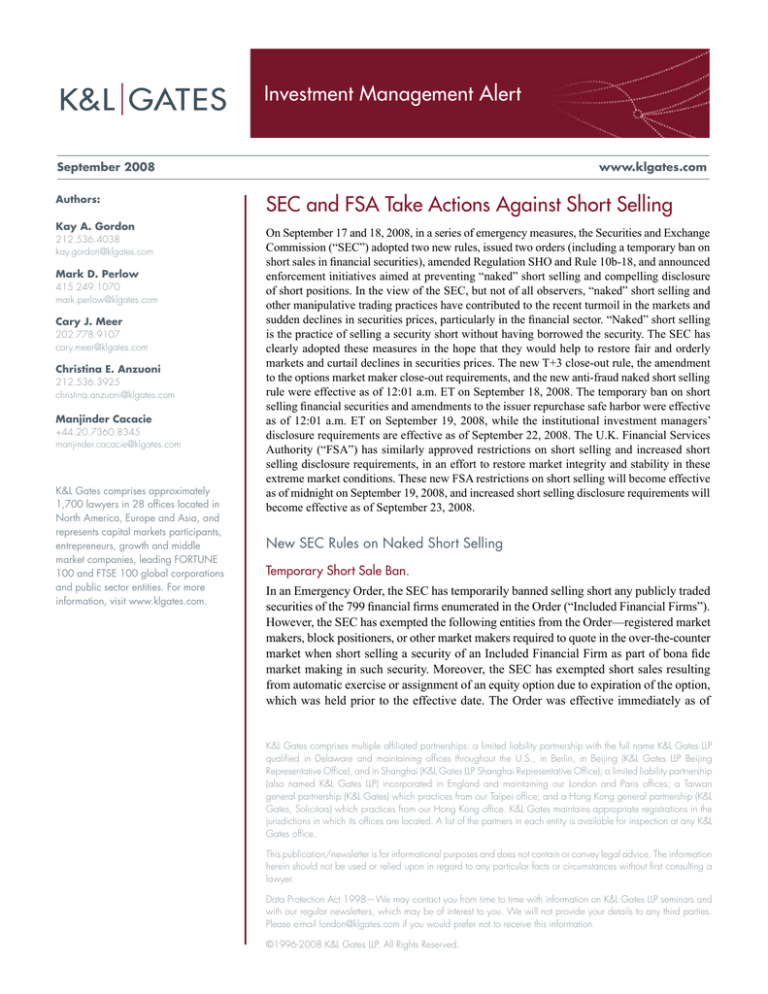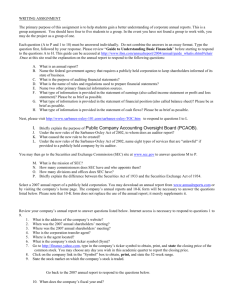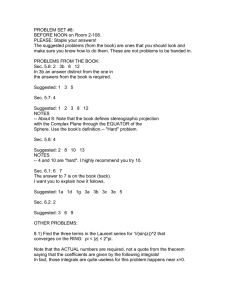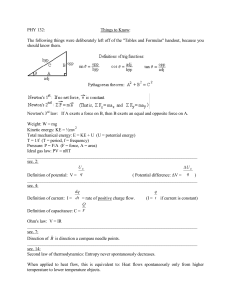
Investment Management Alert
September 2008
Authors:
Kay A. Gordon
212.536.4038
kay.gordon@klgates.com
Mark D. Perlow
415.249.1070
mark.perlow@klgates.com
Cary J. Meer
202.778.9107
cary.meer@klgates.com
Christina E. Anzuoni
212.536.3925
christina.anzuoni@klgates.com
Manjinder Cacacie
+44.20.7360.8345
manjinder.cacacie@klgates.com
K&L Gates comprises approximately
1,700 lawyers in 28 offices located in
North America, Europe and Asia, and
represents capital markets participants,
entrepreneurs, growth and middle
market companies, leading FORTUNE
100 and FTSE 100 global corporations
and public sector entities. For more
information, visit www.klgates.com.
www.klgates.com
SEC and FSA Take Actions Against Short Selling
On September 17 and 18, 2008, in a series of emergency measures, the Securities and Exchange
Commission (“SEC”) adopted two new rules, issued two orders (including a temporary ban on
short sales in financial securities), amended Regulation SHO and Rule 10b-18, and announced
enforcement initiatives aimed at preventing “naked” short selling and compelling disclosure
of short positions. In the view of the SEC, but not of all observers, “naked” short selling and
other manipulative trading practices have contributed to the recent turmoil in the markets and
sudden declines in securities prices, particularly in the financial sector. “Naked” short selling
is the practice of selling a security short without having borrowed the security. The SEC has
clearly adopted these measures in the hope that they would help to restore fair and orderly
markets and curtail declines in securities prices. The new T+3 close-out rule, the amendment
to the options market maker close-out requirements, and the new anti-fraud naked short selling
rule were effective as of 12:01 a.m. ET on September 18, 2008. The temporary ban on short
selling financial securities and amendments to the issuer repurchase safe harbor were effective
as of 12:01 a.m. ET on September 19, 2008, while the institutional investment managers’
disclosure requirements are effective as of September 22, 2008. The U.K. Financial Services
Authority (“FSA”) has similarly approved restrictions on short selling and increased short
selling disclosure requirements, in an effort to restore market integrity and stability in these
extreme market conditions. These new FSA restrictions on short selling will become effective
as of midnight on September 19, 2008, and increased short selling disclosure requirements will
become effective as of September 23, 2008.
New SEC Rules on Naked Short Selling
Temporary Short Sale Ban.
In an Emergency Order, the SEC has temporarily banned selling short any publicly traded
securities of the 799 financial firms enumerated in the Order (“Included Financial Firms”).
However, the SEC has exempted the following entities from the Order—registered market
makers, block positioners, or other market makers required to quote in the over-the-counter
market when short selling a security of an Included Financial Firm as part of bona fide
market making in such security. Moreover, the SEC has exempted short sales resulting
from automatic exercise or assignment of an equity option due to expiration of the option,
which was held prior to the effective date. The Order was effective immediately as of
K&L Gates comprises multiple affiliated partnerships: a limited liability partnership with the full name K&L Gates LLP
qualified in Delaware and maintaining offices throughout the U.S., in Berlin, in Beijing (K&L Gates LLP Beijing
Representative Office), and in Shanghai (K&L Gates LLP Shanghai Representative Office); a limited liability partnership
(also named K&L Gates LLP) incorporated in England and maintaining our London and Paris offices; a Taiwan
general partnership (K&L Gates) which practices from our Taipei office; and a Hong Kong general partnership (K&L
Gates, Solicitors) which practices from our Hong Kong office. K&L Gates maintains appropriate registrations in the
jurisdictions in which its offices are located. A list of the partners in each entity is available for inspection at any K&L
Gates office.
This publication/newsletter is for informational purposes and does not contain or convey legal advice. The information
herein should not be used or relied upon in regard to any particular facts or circumstances without first consulting a
lawyer.
Data Protection Act 1998—We may contact you from time to time with information on K&L Gates LLP seminars and
with our regular newsletters, which may be of interest to you. We will not provide your details to any third parties.
Please e-mail london@klgates.com if you would prefer not to receive this information.
©1996-2008 K&L Gates LLP. All Rights Reserved.
Investment Management Alert
12:01 a.m. ET on September 19, 2008 and terminates
at 11:59 p.m. EDT on October 2, 2008, unless further
extended by the SEC, but in no event will the SEC
extend the short selling ban beyond 30 days in total
duration. The Order does not apply until 11:59 p.m. on
September 19, 2008 for market makers when selling
short as part of bona fide market making and hedging
activities related directly to bona fide market making
in derivatives on the securities of an Included Financial
Firm. On September 19, the SEC issued a statement
that the staff is recommending a modification to the
Order, which would extend, for the life of the Order,
the exemption for hedging activities by exchange and
over-the-counter market makers in derivatives on the
securities covered by the Order.
Institutional Investment Managers’
Disclosure Requirements.
Pursuant to another SEC Emergency Order, institutional
investment managers that exercise investment
discretion over accounts with section 13(f) securities
having an aggregate fair market value (on the last
trading day of any month of any calendar year) of at
least $100,000,000 must disclose certain short positions
by filing Form SH with the SEC. Thus, any manager
who has filed or was required to file a Form 13F for the
calendar quarter ended June 30, 2008 is also required
to file Form SH on the first business day of every
calendar week immediately following a week in which
it effected short sales. For a given security, Form SH
must disclose the number and value of securities sold
short for each section 13(f) security (except for short
sales in options), the opening short position, the closing
short position, the largest intraday short position, and
the time of the largest intraday short position, for
that security for each calendar day of the prior week.
However, if a manager has not effected any short sales
since the previous Form SH filing, the manager is not
required to file. An institutional investment manager
will also not need to report short positions if (i) the
short position constitutes less than one-quarter of one
percent of the class of issuer’s section 13(f) securities
outstanding and (ii) the fair market value of the short
position in the section 13(f) securities is less than
$1,000,000. This Order is effective as of 12:01 a.m.
EDT on September 22, 2008, the first Form SH must
be filed on September 29, 2008, and the Order will
terminate at 11:59 p.m. on October 2, 2008, unless
further extended by the SEC. This Order applies only
to short sales effected after the effective date.
Issuer Repurchases.
Additionally, the SEC has temporarily eased the
timing and volume conditions of the safe harbor for
issuer repurchases in Rule 10b-18 under the Securities
Exchange Act of 1934 (the “Exchange Act”). The
Order suspends the “time of purchases” condition
in paragraphs (b)(2)(i), (b)(2)(ii), and (b)(2)(iii) of
Rule 10b-18 for an issuer or affiliate purchaser to
make a Rule 10b-18 purchase or bid, but the issuer or
affiliate must still otherwise meet all the conditions in
Rule 10b-18. However, the SEC modified the volume
condition of paragraph (b)(4) of the Rule so that the
amount of Rule 10b-18 purchases must not exceed
100 percent of the average daily trading volume for
the security. The Order was effective as of 12:01 a.m.
EDT on September 19, 2008 and terminates at 11:59
p.m. on October 2, 2008, unless further extended by
the SEC.
T+3 Close-Out Requirements.
Pursuant to new Rule 204T of Regulation SHO
(adopted on an interim basis), short sellers and their
broker-dealers must generally deliver securities by
the close of business on the settlement date, which
is three days after the sale transaction date (“T+3”).
In accordance with this new Rule, any broker-dealer
failing to settle a short sale on a short seller’s behalf by
the T+3 time period is now prohibited from further short
sales in the same security both for that particular naked
short seller and for any other customers. However, the
broker-dealer can avoid this prohibition for any future
short sales by locating and borrowing the shares in
question before the sale. The T+3 delivery requirement
is subject to certain exceptions for equity securities
sold pursuant to Rule 144 under the Securities Act of
1933. The SEC has instituted a 30-day comment period
for Rule 204T, which was effective as of 12:01 a.m. ET
on September 18, 2008 and applies to fails to deliver
resulting from trades that occur after the effective date
but does not apply to the positions that were open prior
to it. Such positions will continue to be subject to the
requirements of Regulation SHO as it existed prior to
the effective date.
New Rule 204T differs in two important respects from
the SEC’s prior temporary prohibition (adopted in July)
on naked short selling in the shares of certain financial
firms. First, the new rule applies to all publicly traded
companies’ securities. Second, the rule does not require
that broker-dealers borrow securities before they are
July 2008 | 2
Investment Management Alert
sold short, but rather that the securities be borrowed
before settlement.
Options Market Maker Close-Out Requirements.
The SEC also amended paragraphs b(3)(iii) and b(3)(v)
of Rule 203(b)(3) of Regulation SHO to eliminate the
exception for options market makers from Regulation
SHO’s close-out requirements. Pursuant to amended
Rule 203(b)(3), options market makers must generally
close out short sales within the T+3 timeframe;
however, a seller that has a pre-existing “fail to deliver”
position that was eligible for the exemption prior to
the effective date of the amendments can and must
close that position within 35 consecutive settlement
days of the effective date of this amendment. The
SEC’s position is that it is necessary to eliminate this
exception to impose enhanced delivery requirements
on sales of all equity securities. This amendment was
effective as of 12:01 a.m. ET on September 18, 2008.
Anti-Fraud Naked Short Selling Rule.
The SEC also adopted a new anti-fraud rule addressing
“deceptive” naked short selling. New Rule 10b-21
under the Exchange Act prohibits a seller of a security
from deceiving a broker-dealer or any other market
participant about its ability or intent to deliver the
security on or before the settlement date and then
failing to deliver the security on or before the settlement
date. The new anti-fraud rule is intended to supplement
the existing general anti-fraud provisions of the U.S.
federal securities laws, such as Section 10(b) of the
Exchange Act and Rule 10b-5 thereunder, but not in
any way to limit such provisions. This amendment was
effective as of 12:01 a.m. ET on September 18, 2008.
SEC Enforcement Initiatives
According to Chairman Cox and SEC Director of
Enforcement Linda Chatman Thomsen, the SEC’s
Division of Enforcement is intensifying its enforcement
measures against market manipulation. The Division
of Enforcement will require significant hedge funds
and other institutional traders to secure all their
communication records regarding their past trading
positions in specific securities. A number of our clients
have reported that the Division of Enforcement has
issued subpoenas for these trading records.
FSA Short Selling Ban on Financial Securities
In addition, the FSA has also introduced new provisions
to the Code of Market Conduct that ban short selling
in financial stocks in the United Kingdom. This ban
prevents the active creation or increase of net short
positions in 29 publicly quoted financial companies.
The FSA has now published the list of companies
covered by these new provisions, which can be
found on the FSA website, http://www.fsa.gov.uk/
pubs/handbook/list_instrument200850.pdf. The FSA
stated that, while it views short selling as a legitimate
investment technique in normal market conditions,
the ban was a necessary measure against disorderly
markets.
The FSA has increased the disclosure requirements
for short positions in these companies. Pursuant to the
new provisions, the FSA will require daily disclosure
of net short positions that exceed .25% of the listed
financial companies’ ordinary share capital as of the
market close on the previous working day. These new
disclosure requirements will become effective on
September 23, 2008 and the net short positions held at
the close on September 19, 2008 must be disclosed by
September 23, 2008.
These provisions will remain effective until January
16, 2009 and will be reviewed after a 30-day period.
The FSA also intends to publish a comprehensive
review of the short selling rules in January.
Public and Industry Response
Some lawmakers and regulators support the SEC’s ban
and limits on short sales imposed by these initiatives,
alleging short sellers have contributed to the current
market turmoil by spreading false information and
using abusive tactics to attack companies. New
York Attorney General Andrew Cuomo stated in
media reports that he has initiated a wide-ranging
investigation into short selling in the financial market.
His office intends to investigate allegations that short
sellers have spread false rumors about several financial
companies, contributing to the recent downward
pressure on these companies’ stock prices. Mr. Cuomo,
Sen. Charles Schumer, Sen. Hillary Clinton, and Phillip
Purcell, former Morgan Stanley Chairman and CEO,
all called for the temporary ban on short selling of
financial stocks. Mr. Purcell further calls for the SEC
to reinstitute the uptick rule, which allowed short sales
only if a preceding trade raised a company’s stock
price. Republican Presidential candidate John McCain
July 2008 | 3
Investment Management Alert
said that Chairman Cox should be fired for having
“kept in place trading rules that let speculators and
hedge funds turn our markets into a casino.”
In addition, several of the largest institutional
investors in the United States, including the California
Public Employees’ Retirement System (CalPERS),
the California State Teachers’ Retirement Systems
(CalSTRS) and the New York State Common
Retirement Fund, announced that they are no longer
lending out shares of Goldman Sachs Group, Morgan
Stanley, Wachovia, and other financial firms whose
share prices have fallen recently. According to media
reports, the CEOs of Goldman Sachs and Morgan
Stanley have told government officials and employees
that short sellers and false rumors are partly to blame
for the decline in their firms’ share prices.
Conclusion
Under intense political and public pressure, the SEC
and the FSA have instituted several new rules and
initiatives affecting short selling in an effort to restore
market stability. The SEC in particular believes that
these emergency measures will significantly reduce the
possibility that naked short selling may contribute to
current market disruptions and has clearly stated that
it intends to enforce the new rules. Market participants
engaging in short sales need to pay close attention to
the SEC’s and FSA’s intensified interest in this area.
Many hedge fund managers and other investors
disagree, however, suggesting that risk management
failures and poor business strategies are to blame for
the current market instability. According to Richard
H. Baker, President and CEO of the Managed Funds
Association (“MFA”), these SEC and FSA initiatives
banning and restricting short sales “could inflict longterm damage on the markets by reducing liquidity and
may well further market instability” as “[s]hort selling
is a legitimate investment strategy that responds to
market fundamentals and contributes to the proper
setting of stock prices.” Opposing the temporary short
selling ban, Mr. Baker questioned the benefit of such
a ban given the failure of a similar SEC Order in July
(“July Order”) to ultimately benefit the stocks the Order
was meant to protect, citing the decline of those stock
prices during the July Order. Mr. Baker also opposed
the increased disclosure requirements for institutional
investment managers, contending disclosing such
“proprietary information will be harmful to the
institutional investment managers’ investors and their
underlying businesses.”
July 2008 | 4




